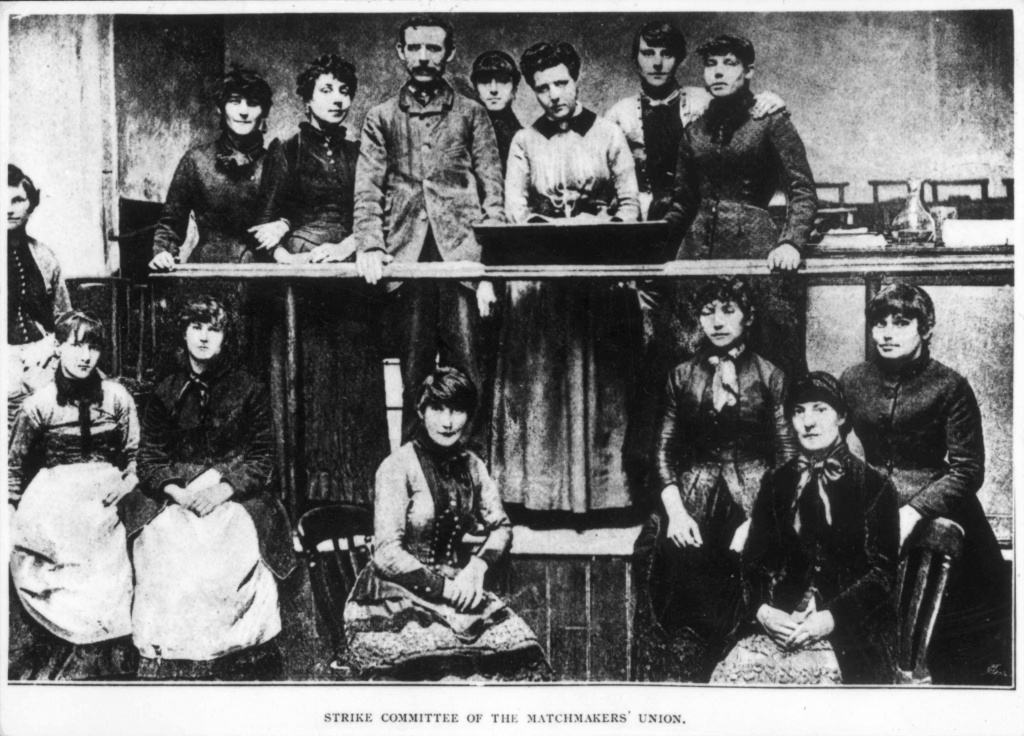 Bryant and May match girls strike committee, 1888. Photo: TUC Library Collections, London Metropolitan University
Bryant and May match girls strike committee, 1888. Photo: TUC Library Collections, London Metropolitan University
Women workers have been at the forefront of every new wave of struggle
The fight for women’s equality has always been a central to the workers’ struggle.
The roots of International Women’s day lies in a day of celebration of the struggle of women garment workers in New York. Each 8 March we celebrate such inspirational struggles, but it also provides a moment for us to reflect on past struggles in order to better be able to shape our futures.
The rights we have achieved have been won through a rich history of militant action, mass campaigns and even hunger strikes.
In this spirit of revolt the Match Girls launched a strike against their employers the Bryant and May factory in 1888.
They won and their victory helped spark the Great dock Workers strike of 1889 in 60,000 workers struck closing the Port of London for over a month. These struggles launched “New Unionism” and gave the working class an energy not seen since Chartism.
As the twentieth centuary began women again played a leading role.
Suffragettes
The Suffragettes brought together heroic militancy and direct action with mass campaigning which both raised the question of women’s right to vote and deepened a the sense of crisis in British society.
After World War One the right to vote for Women was granted, although full enfranchisement had to wait until 1928.
Women would play a role in the great upsurge of workers militancy at the end of the 1960s. But this time the role of women workers was even more prominent.
In 1969, 187 sewing machinists walked, demanding their labour should be recognised as just as skilled as men’s. They won and their struggle inspired others to follow their example.
It also led to the passing of the Equal Pay Act., an important step forward, but clearly this is not a battle that is not yet won, as seen by the continuing pay gap.
Not all the struggles were victorious but even the when defeated women workers struggles were inspirational.
Grunwicks ‘76
In 1976 the women workers walked out against bad management, poor working conditions and the right to join a union. Led by Jayaben Desai this strike by Asian immigrant women became one of the longest in labour history. Their struggle gained massive support in the labour movement and the mass pickets of the factory saw miners and other trade unionists travel from across the country to join their picket line.
A generation later it was a group of young homeless women who played a key role in the rise of the housing movement. In 2013, 29 young mothers were evicted from their hostel in Newham after the council cut funding, and in reaction they set up the E15 campaign. Together these women made a political occupation on a nearby estate to bring attention to the way houses were left empty whilst they faced eviction.
This direct action pushed Newham council to repopulate 40 homes on the estate. They also headed London’s March for homes, bringing attention to the wider matter and pushing it out into the press – gaining wide support from trade unionists and campaigners across the country.
Much has been achieved. But there is still much to fight for. Basic pay inequality remains a scandal. Domestic violence, rape, objectification and the ongoing division of labour remain problems that shape our everyday lives.
But we can look back at our past struggles to see that it is the through the struggle which we will win our liberation.

